
- Obesity increases the risk of health problems such as heart disease, stroke, type 2 diabetes, arthritis, and several types of cancer.
- New research suggests that it may also accelerate brain aging.
- The researchers found that obesity and a high fat diet damaged blood vessels in the brains of mice, reducing oxygen supply to brain cells and leading to cognitive decline.
Obesity is a growing public health concern worldwide. According to the
Prevalence in the United States is much higher, with the
The condition is a growing concern in younger people — the WHO reports that 160 million children and adolescents around the world were living with obesity in 2022.
A person with overweight has an increased risk of health problems, and these risks are greater the more overweight a person is. Obesity increases the risk of many
- cardiovascular disease (mainly heart disease and stroke)
- type 2 diabetes
- musculoskeletal disorders like osteoarthritis
- some cancers (endometrial, breast, and colon)
A new study, to be presented at the American Physiology Summit April 4–7 in Long Beach, CA, and the results of which are yet to be published in a peer-reviewed scientific journal, suggests that obesity may also accelerate brain aging and lead to cognitive decline.
Lead study author Dr. Sharon Negri, a postdoctoral fellow in the Department of Neurosurgery at the University of Oklahoma Health Sciences Center, told Medical News Today:
“Diet-induced obesity is known to trigger a range of systemic inflammatory responses that can have widespread effects on the body, including the cerebrovasculature. One primary reason obesity might induce senescence in the cerebrovasculature is due to the chronic inflammatory state it creates.”
“Adipose tissue in obese individuals secretes various bioactive molecules, including pro-inflammatory cytokines, which can circulate and affect distant organs, including the brain,” Dr. Negri explained.
“These inflammatory signals can contribute to vascular cells aging, facilitating the development of senescence in the brain, thus impairing the vessels’ ability to regulate blood flow and respond to neural activity,” she added.
In this latest study, the researchers looked at how obesity and a high fat diet affected the brain blood vessels in mice and what effect this had on cognitive function.
They fed novel transgenic mice (p16-3MR mice, in which senescent cells can be visualized and selectively eliminated) on a diet containing 60% fat or a 10% fat diet.
In the mice on the high fat diet, the researchers saw an increase in
“The findings in the present animal study indicate that obesity and unhealthy dietary habits contribute to the accumulation of damage in blood vessels, which diminishes oxygen delivery to specific brain regions and may culminate in cognitive deterioration,” Kelsey Costa, a registered dietitian nutritionist and founder of Dietitian Insights, who was not involved in the study, told MNT.
The high fat diet increased the number of senescent endothelial cells in mice and also showed impaired cognitive function measured on the radial arm water maze test (RAWM).
To investigate the significance of these senescent cells, researchers treated older mice with obesity on a high fat diet with Navitoclax/ABT263, which selectively kills these cells. Following treatment, the mice showed improved cognitive function.
“Obesity-related inflammation may contribute to vascular dysfunction, potentially affecting cognitive processes, Şebnem Ünlüişler, a genetic engineer at the London Regenerative Institute, who was not involved in the study, told MNT.
“Even though the research was conducted on mice, it gives us useful hints about what could happen in people.”
“It’s exciting that removing senescent cells improved the brains of obese mice, suggesting a way to help with obesity-related brain problems. Eliminating senescent cells in the brains of obese mice using Navitoclax seemed to improve brain vasculature, which could be a good way to deal with obesity-related cognitive decline.”
— Şebnem Ünlüişler, genetic engineer
“Our research, along with studies from other groups, has demonstrated that strategies designed to eliminate senescent cells can significantly reverse or prevent the cognitive decline associated with aging,” Negri said.
“This promising discovery, however, does not mean we advocate for the use of Navitoclax by healthy elderly individuals as a direct therapeutic measure,” she cautioned.
Ünlüişler agreed that more evidence was needed.
“Further research into the molecular mechanisms involved and assessing Navitoclax’s safety and efficacy in human cognitive function would be enlightening,” she said.
Negri advised that maintaining a healthy weight or, for those with obesity, losing weight helps prevent cerebrovascular and cognitive changes in older age.
“Our primary objective is to delve into the specific role that senescent cells play both in the natural aging process and in relation to obesity. By focusing on these areas, we aim to uncover the fundamental mechanisms by which aging affects our bodies and minds. Ultimately, our research seeks to pave the way for developing targeted, effective strategies that not only improve the aging process but also significantly enhance the overall quality of life in our later years.”
— Sharon Negri, lead study author
“Losing weight and maintaining a healthy weight can […] reduce inflammation and oxidative stress, both of which are implicated in cerebrovascular damage and cognitive decline. Additionally, a healthy weight supports good physical health, which is closely linked to brain health,” said Negri.
Costa echoed this advice:
“While more clinical research is needed, this is far from the first study to suggest that weight and nutrition directly affect brain health,” she noted. “Therefore, maintaining a healthy weight through proper diet and exercise may be essential in preserving vascular health and cognitive function as we age.”
“While regular physical activity and an overall healthy dietary pattern are key, some specific foods and nutrients are being studied for their positive impacts on vascular health. A few of these include blueberries, plums, beetroot, pomegranate juice, and omega-3 fatty acids found in fish, nuts, and seeds. These foods have been shown to improve blood flow, reduce inflammation, and protect against oxidative stress.”
— Kelsey Costa, registered dietitian
